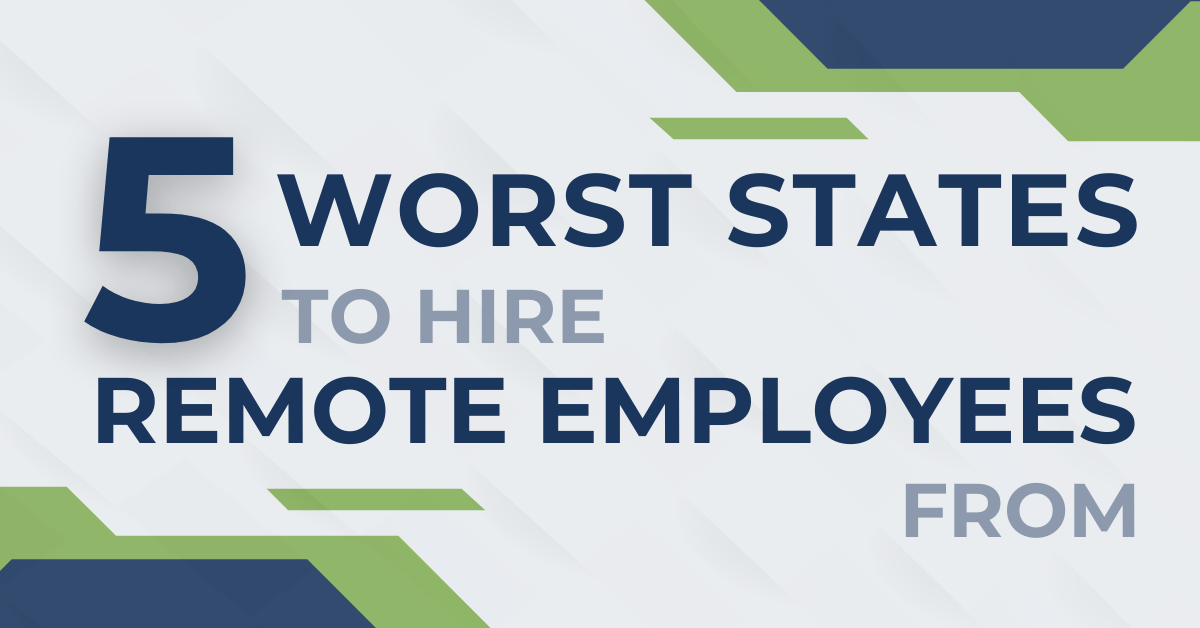
Hiring remote workers sounds like a dream—but in some states, it’s more like a nightmare.

Before remote hiring, just regular hiring had its challenges. Writing the job ad, getting people to show up through the interview process, and actually finding the right people—it's a huge task!
That’s why many employers have turned to hiring remote workers as a solution. While remote work offers flexibility for both the hiring team and employees, it also brings a new set of complexities for an employer to be aware of.
The big dangers for remote workers? Income tax nexus, HR compliance nightmares, and special payroll items. With that in mind, here are the five worst states to hire remote employees from because of all the red tape, hoops, and landmines you'll have to dodge.
1. California Dreaming… Until You See the Paperwork
California—famous for its beautiful weather, surfing, and 90s gangsta rap—is also notorious for its bureaucracy from hell. It’s for that precise reason that California presents unique compliance requirements for remote hiring. The state has comprehensive labor laws and tax regulations that demand attention.
We’ve hired a couple of remote employees from California, and each time the costs far outweighed the benefits. With income taxes ranging up to 12.3%, the state's overtime rules, HR class requirements, and potential governmental overreach made managing California-based remote employees more trouble than it was worth.
2. New York: Big Taxes in the Big Apple
New York’s always awake—and so will you be, trying to figure out its tax situation.
New York’s booming economy and diverse talent pool make it a hub for business, but it also comes with more tax brackets than I care to count.
Employers hiring remote workers here need to navigate state, city, and local borough taxes, on top of New York’s notoriously high wages.
It’s no wonder so many New Yorkers move to Florida to retire—it’s not just the warm weather! The tax burden and high cost of living here can drive up your labor costs faster than you might expect.
3. Pennsylvania: Where Local Taxes Hit Harder Than Rocky
Pennsylvania, home to Ben Franklin, Rocky, and Cheesesteaks, also has one of the most complex local tax systems around. The state’s incredibly intricate tax rules can make payroll management difficult for companies unfamiliar with the state's tax structure.
Local taxes, which vary by city, township, and school district are tricky–and dealing with small tax offices and long wait times for customer support doesn’t make it any easier. Let’s just say, patience is key when you’re on hold for over two hours! So much for the "City of Brotherly Love".
4. Ohio's Taxes Have More Layers Than a Buckeye
If Pennsylvania had a bad neighbor, it would be Ohio. Ohio’s tax system is even worse, with state, local, county, and school district taxes to consider.
Although this may make perfect sense for those in the state, those of us not living in Ohio now have an immense amount of detail to sort through.
There are many choices to make when hiring a new employee and getting all your accounts set up. It is easy to miss one, and the extra compliance is another decision to consider before saying yes to that new remote employee.
5. New Jersey: Worker Classifications as Complicated as the Turnpike
New Jersey is famous for its turnpikes, diners, and the shore, but hiring remotely from here? That’s a whole other kind of roadblock.
The state has strict worker classification rules, meaning you need to be extra careful when determining whether someone is a contractor or an employee.
On top of that, New Jersey’s high-income taxes and other regulatory requirements make it a challenging state for employers hiring remotely. Before you send that offer letter, be sure you’ve done your homework on the state’s worker classification rules and tax obligations.
Is Hiring Remote Workers Worth the Red Tape?
While remote hiring from these states can be challenging, that doesn’t mean it’s the wrong choice for your business. The key is being informed—knowing the tax implications, compliance requirements, and labor laws before making the hire can help you avoid unnecessary headaches.
If you’re prepared to tackle the unique challenges that states like California and New York present, remote workers can still be a great addition to your team. Do your due diligence, stay organized, and consider consulting with experts so you don’t run into compliance issues down the road.
And who knows? That remote worker may be exactly who your company needs.
More Resources for Hiring Remote Employees
Thinking about hiring someone to work remotely? We’ve created several resources to make sure you’re prepared to do it right. Check out the following:
- How to Setup Payroll Taxes with Remote Employees
- Increasing Engagement with Remote Employees
- What to Consider When Hiring Remote Employees
Do you have even MORE questions? We're betting that we have the answers. Feel free to give us a call and chat about your needs, whether it's hiring, payroll, or whatever is on your mind. We're here to help.
Topics:
